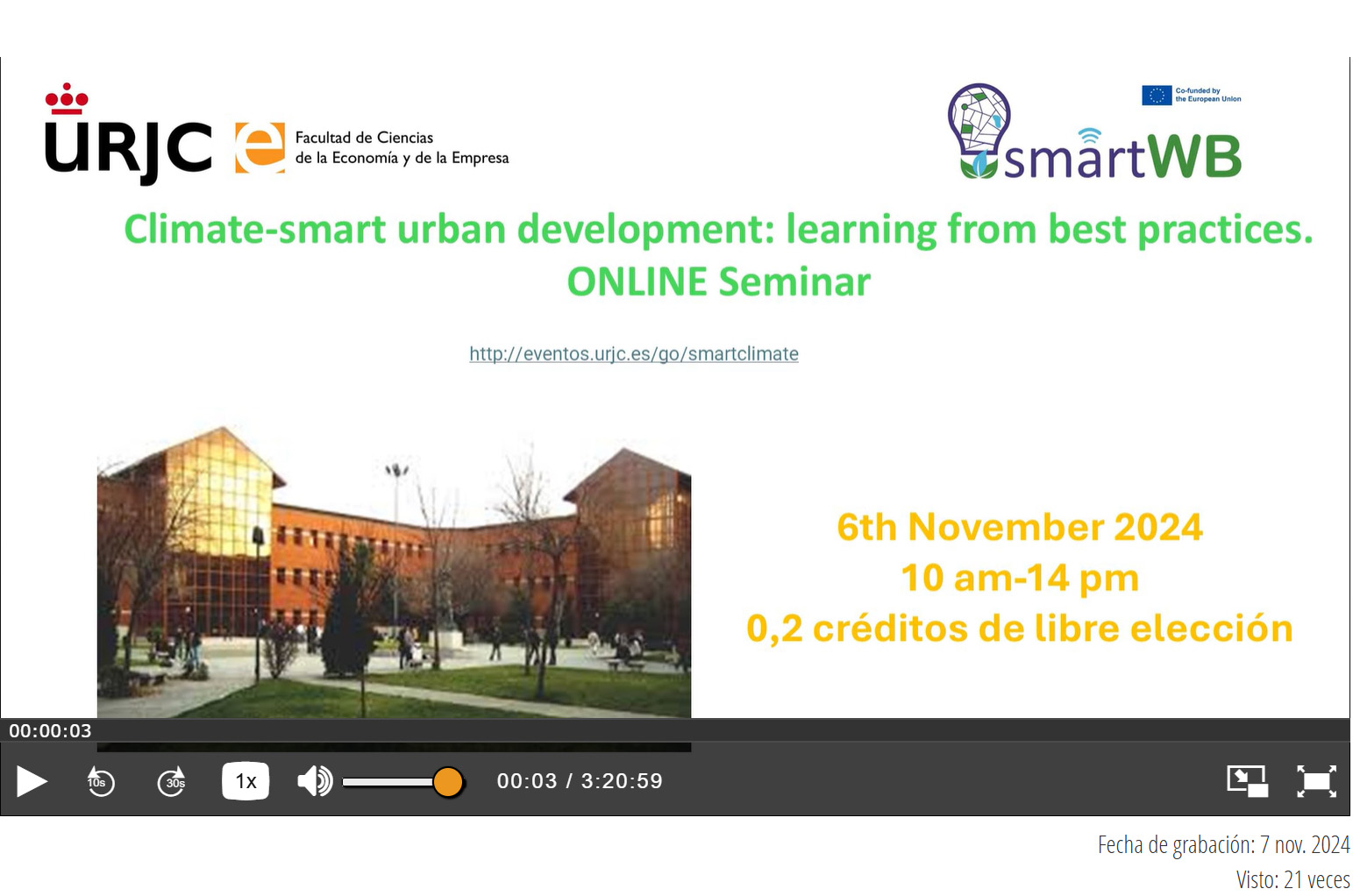
On November 6, the international online seminar Climate-smart urban development: learning from best practices was held at the Faculty of Economics and Business Sciences, University Rey Juan Carlos from 10 a.m. to 2 p.m. , within the Research Workshops program of the Faculty of Economics and Business Sciences – 2024 and within the framework of the European project Curricula innovation in climate-smart urban development based on green and energy efficiency with the non-academic sector, SmartWb. Following the presentation of the seminar and the link between its theme and the European project by Carmen de Pablos Heredero , Professor of Business Organization at the FCEE, Professor Vuk Milosevic, from the Faculty of Civil Engineering and Architecture of the University of Nis, Serbia, gave the first presentation on the topic of Architectural Structures appropriate for sustainable urban development, highlighting their advantages - they are healthier, produce more oxygen and are aesthetically more attractive - but also their limitations - they are not immediate and not always modifiable, but always offering arguments from the perspective of economic, social and environmental sustainability in favor of the potential of new types of membranes.
Professor Harsha Ratnaweera, an expert in water and wastewater technology at the Faculty of Science and Technology at the University of Life Sciences in Norway, then focused on the evolution of pollution management principles, confirming that the solution to pollution is dilution. He highlighted the lack of solutions for floods and highlighted the main preventive measures that must be activated in water management to avoid dramatic consequences, including making soils permeable again or converting sports fields into water retention tanks. He emphasized the development of technology aimed at water management, offering some success stories in Norway and considering wastewater as another resource to be optimized. After a short break, Professor Milan Gocic, Professor of Computer Engineering at the Faculty of Civil Engineering and Architecture at the University of Nis in Serbia, focused his intervention on critically analyzing the way in which digitalization processes are making sustainable urban development viable. He has shown alarming figures that are true evidence that implementing smart solutions when building a city is now a clear priority. He has shown how an appropriate use of technologies can have a positive impact on education in sustainable urban development as well as on the implementation of creative and shared solutions. He has highlighted the importance of empowering students with technological tools that help to visualize impacts on smart urban development. He has highlighted success stories in the application of technology for smart city management such as Singapore, Amsterdam and Barcelona. He has shown projects underway with the aim of achieving more sustainable cities and adapted to climate change emergencies such as the DigiDrain project in Serbia or Eviden to simulate possible climate change scenarios. The Smarten project is based on the use of gamification to train in climate management in urban spaces. He has placed special focus on the convenience of students developing critical thinking when promoting solutions based on quality data.
In the final part of the seminar, the following questions were discussed, posed to the leaders of the work tasks of the Smart WB project work package aimed at innovating academic content in smart urban development. Professors Miguel Blanco Callejo, Professor of Business Organization at the FCEE at the URJC, Sadmira Malaj, Professor of Urban Planning and Management at the University of Polis, Albania, Željko Bačić, Professor of Geodesy at the University of Zagreb, Croatia and Marija Jevric, Professor of the University of Montenegro, Faculty of Civil Engineering, explained the progress of the initiatives developed in the smartWb project that are currently in the implementation period and how they have been received by students, teachers and the productive sector in each geographical area where they are professionally developed. Finally, and after the presentation of the final considerations, by Prof. Miguel Blanco, Marija Jevric, general coordinator of the SmartWb Project, closed the event. A considerable number of professors and students from different URJC Campuses participated very actively in the event.
The event can be seen in full on URJC TV ( link )

